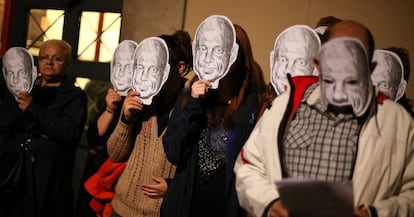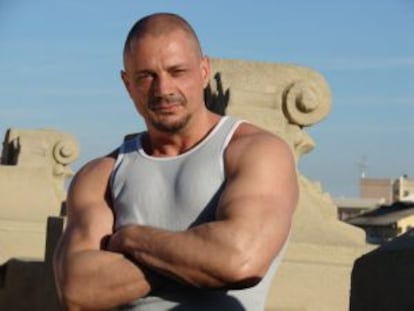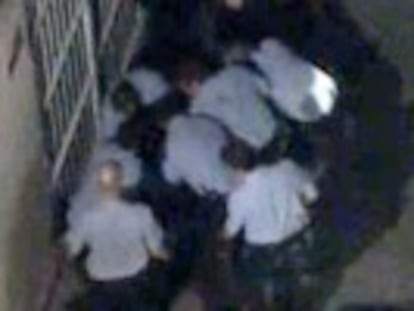A few bad apples..?
The death of a Barcelona businessman has once again raised the issue of brutality on the part of the Catalan regional police force

The death of businessman Juan Andrés Benítez following his violent arrest in Barcelona's central Raval district is just the latest in a long line of such incidents that have earned Catalonia's Mossos d'Esquadra regional police force a reputation for impunity, further damaging its reputation. The crisis unleashed by video footage released by EL PAÍS of several officers repeatedly kicking and punching Benítez as he lay inert on a Barcelona sidewalk on the night of October 5 has reached the highest echelons of power in the northeastern region. But will anything change the way some sections of Catalonia's Mossos operate?
The Catalan regional police force faces two major problems, say the experts. The first is the behavior of its riot police unit, which hit the world's headlines in May 2011 after officers poured into Barcelona's Plaça de Catalunya to remove people who were protesting peacefully in a similar manner to those who took part in the Sol square camp-out in Madrid. In Barcelona, demonstrators were beaten and rubber bullets fired.
Similar scenes were repeated in November 2012 during a march in Barcelona on the day of a nationwide general strike called by labor unions. Ester Quintana, one of the marchers, lost an eye when police opened fire to disperse the crowd using rubber bullets. The regional government has given several contradictory versions of the events in an attempt to corroborate the Mossos' version of what happened. The incident is still under investigation, with two officers having been targeted in the judicial investigation.
The second problem is the presence of small groups of officers at certain precincts who behave with impunity - the bad apple theory. Eight of the officers being questioned over the death of Benítez belonged to the Raval police station. "The fact that we have one or two bad apples doesn't mean that we can write off the rest of the unit," says Manel Prat, the head of the regional police force in Catalonia. He has so far resisted calls for him to step down.
Last year a woman lost an eye when police used rubber bullets on a crowd
"These are pockets of bad practice," says security expert Gemma Galdon. "They are places where irregular practices take place and nobody does anything to stop it. Those who do not agree ask for a transfer, and the rest stay. Bad practice forces the good officers out, and attracts the bad ones," she explains.
The downtown Raval area of the Catalan capital is among the city's most problematic, and has a high crime rate. Of the 300 officers stationed there, 13 are under investigation: eight for the killing of Benítez, three more for the arrest of a journalist, and another two for beating a motorcyclist with his own helmet for not having his driver's license on him. Separately, one of the officers involved in the investigation into the arrest of a journalist has been sanctioned for posting a video on his Facebook account of Russian police abusing detainees.
Galdon says that the Mossos' problems are rooted in the speed at which the unit was formed, under political pressure. Many of its members have not been properly trained, and lack experience, says the Barcelona University academic who teaches police officers, adding that around 10 percent of her pupils do not understand the job of the police. "These people should not be allowed in." The current Mossos d'Esquadra force was set up in 1983.
The Benítez case is shocking, but it is not the first time that Catalan police have been caught on film beating a suspect. In 2007, a hidden camera in the force's main Les Corts station in Barcelona captured a group of officers repeatedly abusing detainees.
The regional government's interior department has been obliged to suspend the officers involved in the Benítez case without pay, but continues to back them to the hilt. This despite video footage that clearly shows officers kicking and punching the man, who is being held down by five other agents, and is screaming. After hearing testimony from 11 witnesses, and watching the video, the National Police force has declared that one of the officers hit Benítez five times in the left side of his head, something that the Catalan authorities reject outright. This is a key point, because the autopsy revealed that the victim died from blows to the "cranial-facial" area.
Bad practice forces the good officers out and attracts the bad ones"
The case has divided opinion, and prompted some soul searching. How is it possible that a police unit created after Spain had returned to democracy could earn such a fearsome reputation for brutality in so short a time? Police chiefs, however, say that much of the criticism is unjustified.
Jaume Asens is a lawyer and a member of the defense commission of the Barcelona College of Lawyers. Over the years he has accumulated considerable experience in cases involving allegations of police brutality. Of the 50 or so cases he has handled, he says that around 12 have ended with a sentence against officers. On most occasions, such cases are dismissed for lack of bruising or physical damage.
"There are not enough control mechanisms. Aside from which, the police are over-protected, or if you like, the public is under protected," he argues. Asens says that the Mossos are not the only police unit in the country with a bad reputation. "If the Mossos were the only problem, the only explanation would be the lack of experience and the need to increase their numbers rapidly."
"I don't think that the Mossos lack training or professionalism. Our police force is very competent. You can't create a police force in a couple of years, but that is what we have done, and we have done it well," says Carles Ramió, a professor of political science at the Pompeu Fabra University. Instead, he blames political interference. "Politicians are too involved in running the force, even down to technical details." Ramió says that this has created a heady brew of political and police mutual interests. "They have contaminated each other, if you like. The politicians think like police officers, and vice versa."
This has led to delays and mistakes in dealing with cases like that of Benítez. "If the politicians, instead of thinking strategically, were also immersed in any criticism, then we could defend each other mutually. The politicians would also feel responsible," he says, pointing to an inability on the part of the regional government to take criticism.
"If something goes wrong, who is responsible? The politicians stop being politicians, and this worries the public," Ramió argues, adding that the bad apples will likely be expelled from the force over time.

"There were 9,000 arrests in Raval in 2012. In the rest of the city, things are very quiet. So why not ask ourselves what is going on in this neighborhood rather than what is going on in the police station?" asks David Miquel of the regional police labor union. The unions have closed ranks behind the agents under investigation, seeing the case as an attack on their members. "Putting the Mossos under the microscope is a national sport," says Miquel, who claims that the beating meted out to Benítez was necessary in what was a fast-moving situation.
SICME, the body representing senior officers, agrees that the Raval is a tough district. Jordi Dalmau, SICME's spokesman, says that procedures can, and should, be improved. "The police report, for example, doesn't reflect exactly what happened. This happens in other places as well. But the report must show exactly what happened, even down to the most seemingly insignificant details," he says.
Dalmau accepts however, that the speed with which the Mossos force was set up, and particularly its promotion structure, has created problems. But he says that the video has made everybody an expert in police procedure. "I don't know if they committed an offence or not, but I do know that the procedures they followed could be compatible with the correct methods. At the same time, we have to admit that this probably wasn't the right approach." Dalmau rejects suggestions that officers are not properly trained: "As with all police forces, this is a profession you learn on the street."
The details of the events that led to Benítez's arrest and subsequent killing by police officers are sketchy. It seems that he believed that his dog, a boxer, had been stolen, or had escaped, the day before. He roused neighbors, to no avail, and then went down to the street, where he got into a fight with the husband of a woman he had accused of stealing the animal, pushing and insulting her, threatening to kill her. After a scuffle, Benítez called the municipal police, who took the following statement:
"Are you okay?"
"No, we had a fight, and I am bleeding. Here's the whole family; they have stolen everything."
"So they have robbed you?"
You can't create a police force in a few years, but that is what we've done"
"Yes, they have... this drug makes you lose your vision for a moment, but then you are okay."
The call took place at 10.31pm. Benítez and the man he fought with were slightly injured, but things had calmed down. Then the Mossos arrive. Within moments Benítez is on the ground, and a few minutes later he is handcuffed in the back of a police car suffering a heart attack.
What happened in that short period of time? Who killed Benítez? He wanted to return to his apartment, and according to the Mossos' statement, hit an officer who tried to stop him. The officer's colleagues joined in the fray, and threw Benítez to the ground. The film of officers kicking and punching Benítez, when he was clearly unable to move, have set off political and social repercussions. The judge overseeing the investigation has accused the eight officers involved, not only of torture and homicide, but also of perverting the course of justice by interfering with the investigation: they threw a bucket of water over the area where Benítez was beaten, and told local residents to destroy video footage.
Benítez ran two clothes stores in Barcelona's so-called Gayxample gay district. He had previously lived and worked in London. His friends did not know that he had died until two days after the event. "We were calling him on the cellphone but it was turned off," say Juan Carlos and Andrés, who worked for him. They opened the shops on the Monday and Tuesday, expecting to hear from him, and eventually went round to his apartment, where neighbors confirmed their worst fears: that he was the man who had been killed by police in the Raval, the video of which had been shown on television and the internet.
The police officers allegedly involved in the killing are due to appear before a judge this week. Protest marches are planned.








































